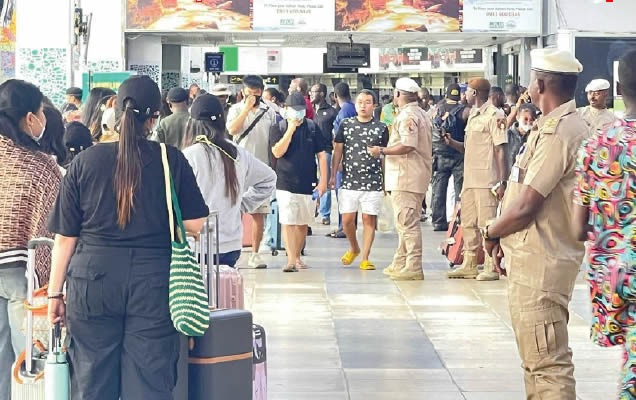Nigeria Deports 192 Chinese, Philippine Nationals Convicted in Victoria Island Cybercrime Raid

The Nigerian Immigration Service (NIS) has commenced the deportation of 192 Chinese and Philippine nationals convicted of cyberterrorism and Ponzi scheme offences, in what authorities have described as a decisive step towards safeguarding national security and financial integrity.
The first batch of 42 convicts was deported on Sunday afternoon aboard a scheduled flight from Murtala Muhammed International Airport, Lagos.
They were among the 759 suspects arrested during a major raid on 10 December 2024 at Oyin Jolayemi Street, Victoria Island, Lagos, which remains one of the country’s largest anti-cybercrime operations to date.
According to officials, the deportation process is being carried out in phases and will continue on Monday and Tuesday until all the convicts are repatriated to their respective countries.
A senior immigration officer at the Lagos airport, who confirmed the development but requested anonymity for security reasons, explained that the action was part of routine enforcement measures.
“Whether it’s a criminal offence or a visa violation, anyone who has served their jail term is typically deported. Even if someone holds a valid immigration status, certain crimes automatically render that status void,” the officer said.
“In this case, these individuals were not deported for immigration violations alone but for criminal activities. We cannot allow foreigners to commit crimes in our country and have Nigerians take the blame for their actions.”
Another senior official within the service noted that surveillance of other foreign nationals suspected of similar offences was ongoing.
“This is part of an operation to ensure that Nigeria’s borders remain secure. Our work is sensitive, and we focus on results, not publicity,” he stated.
The Economic and Financial Crimes Commission (EFCC), which prosecuted the cases, disclosed that the convicts had been operating an elaborate cyberfraud and Ponzi scheme network under the cover of Genting International Co. Limited.
Their offences included the use of false identities, training of employees in fraudulent practices, and other violations under the Advance Fee Fraud and Other Related Offences Act, 2006.
EFCC Chairman, Ola Olukoyede, hailed the deportations as a “significant milestone” in Nigeria’s anti-corruption and anti-cybercrime campaign.
“These convictions send a strong signal that Nigeria will not serve as a haven for cybercriminals. The commission remains committed to intensifying investigations, recovering stolen funds, and restoring national dignity in line with President Bola Tinubu’s anti-corruption drive,” he said.
The December raid that led to the arrests and subsequent convictions was jointly executed by Nigerian law enforcement agencies and has been described as a turning point in the nation’s fight against transnational financial crimes.
Officials stressed that the deportations were carried out after due legal process and in accordance with Nigerian immigration laws, underscoring the government’s resolve to rid the country of criminal networks exploiting its borders.







